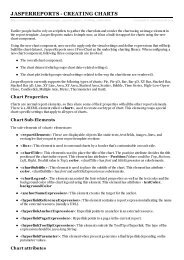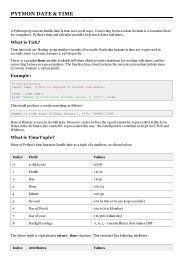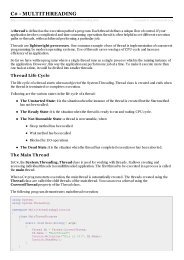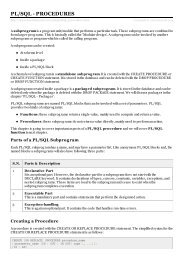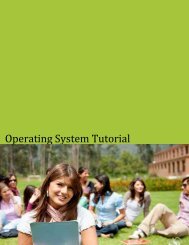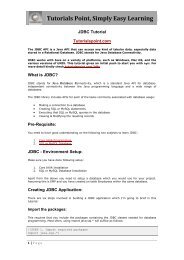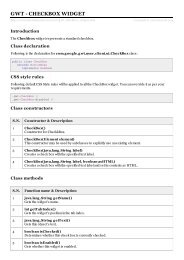download pascal tutorial (pdf - Tutorials Point
download pascal tutorial (pdf - Tutorials Point
download pascal tutorial (pdf - Tutorials Point
Create successful ePaper yourself
Turn your PDF publications into a flip-book with our unique Google optimized e-Paper software.
Defining a Function:<br />
In Pascal, a function is defined using the function keyword. The general form of a<br />
function definition is as follows:<br />
function name(argument(s): type1; argument(s): type2; ...): function_type;<br />
local declarations;<br />
begin<br />
...<br />
< statements ><br />
...<br />
name:= expression;<br />
end;<br />
A function definition in Pascal consists of a function header, local declarations and a<br />
function body. The function header consists of the keyword function and a name given to<br />
the function. Here are all the parts of a function:<br />
<br />
<br />
<br />
<br />
Arguments: The argument(s) establish the linkage between the calling program<br />
and the function identifiers and also called the formal parameters. A parameter is<br />
like a placeholder. When a function is invoked, you pass a value to the parameter.<br />
This value is referred to as actual parameter or argument. The parameter list<br />
refers to the type, order, and number of parameters of a function. Use of such<br />
formal parameters is optional. These parameters may have standard data type,<br />
user-defined data type or subrange data type.<br />
The formal parameters list appearing in the function statement could be simple or<br />
subscripted variables, arrays or structured variables, or subprograms.<br />
Return-Type: All functions must return a value, so all functions must be<br />
assigned a type. The function-type is the data type of the value the function<br />
returns. It may be standard, user-defined scalar or subrange type but it cannot be<br />
structured type.<br />
Local declarations: Local declarations refer to the declarations for labels,<br />
constants, variables, functions and procedures, which are application to the body<br />
of function only.<br />
Function Body: The function body contains a collection of statements that define<br />
what the function does. It should always be enclosed between the reserved words<br />
begin and end. It is the part of a function where all computations are done. There<br />
must be an assignment statement of the type - name := expression; in the<br />
function body that assigns a value to the function name. This value is returned as<br />
and when the function is executed. The last statement in the body must be an<br />
end statement.<br />
Following is an example showing how to define a function in <strong>pascal</strong>:<br />
(* function returning the max between two numbers *)<br />
function max(num1, num2: integer): integer;<br />
var<br />
(* local variable declaration *)<br />
result: integer;<br />
begin<br />
if (num1 > num2) then<br />
result := num1<br />
else<br />
result := num2;<br />
max := result;<br />
end;<br />
TUTORIALS POINT<br />
Simply Easy Learning Page 59



